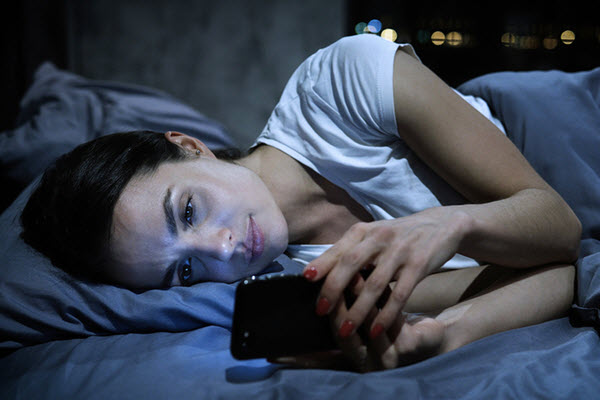My smartphone. My iPad. My laptop. All are almost always on hand, especially the phone. But the amount of time I spend with each has lessened in the past year. This is a matter of intention, of discipline, and occasionally it’s a struggle. Yet the more I see people out and about staring into their small screens, the more I’m happy with my decision, even when it’s tough to abide. And I wonder if you too feel like you can’t quite quit your devices.

Sure, there are benefits to 24/7 availability, 24/7 access, not to mention the delicious dopamine spike of that “ping” announcing another text! Another follower! A thumbs up from a Facebook friend!
We all love the feeling of being loved, right? If not loved, then liked. If not liked, then noticed. And who among us doesn’t harbor a need to be acknowledged in our increasingly divisive and disconnected world?
Just a Dash of Narcissism?
For some of us, the need to be noticed — no matter the reason — is stronger than we may care to admit. Is this narcissism? Now, now. Not necessarily. Narcissism is more complex than that. But what happens when social media (or texting) becomes so much a part of your daily life — as notice from people you’ve never actually seen interrupts your family time, or reassurance from a “crowd” can boost or dash your hopes — that you dispense with hours you once devoted to meeting people, to cultivating deep friendships, to reading, or to pursuing your passions?
 Let’s face it. Excessive use of our devices is a problem. We know it. We observe it. We live it.
Let’s face it. Excessive use of our devices is a problem. We know it. We observe it. We live it.
We reach for the small screen at all hours to check our feeds, we thrill to the rush when we’re receiving positive responses, and we’re crestfallen when there is a silence, an empty space, a nastygram from the latest “anonymous” responding to a recent selfie.
Is It Real If It FEELS Real?
Our emotions are increasingly wrapped up in what isn’t real, though it feels real. What appears on our screens is immediate. Important. Certainly, it’s insistent.
As Psychology Today explains the phenomenon of social media addiction:
… social media use for a minority of individuals is associated with a number of psychological problems, including anxiety, depression, loneliness, Attention Deficit Hyperactivity Disorder, and addiction. Because social media is most frequently accessed via smartphones, their usage is intimately intertwined and their mobile nature contributes to excessive checking habits…
The article also points out the potential for negative consequences when our attention is divided — for example texting when we should be paying attention to where we’re walking (or driving!).
Not Alone, Even If Alone
I was speaking with a thirtysomething friend recently — yes, speaking, not texting — and she commented that she spends less time online than she once did. Sure, the real world requires that we are comfortable communicating online — effectively promoting our products, our services — and utilizing social media in rational, reasonable and responsible ways.
As my dance card is not terribly filled these days — neither socially nor professionally — the potential pull of the online world could be more intense than ever. Weirdly, it is not. Happily, it is not.
Concerns over lax security of personal data (much in the news in the past year) may be one factor in my incremental withdrawal, but I began reducing online involvement before those revelations. I felt too tied to the rapid-fire flare-ups and callous caprices of a universe that I couldn’t touch, smell, taste, and truly see. I felt less alone in being alone, yet somehow, more chillingly isolated.
Clearly, I’m not alone in my admiration for useful apps or my reliance on a smartphone. Clearly, I am aware when my use borders on excessive. Just as clear — feeling alone is, for some of us, both cause and effect.
What Sparks Our Device Dependence?
To the extent that we can honestly examine why and how we are connected to virtual friends (and strangers), or glued to platforms that are little more than empty calories, perhaps we can make positive changes in the way we lead our real-world lives.
Is app and device dependence a matter of masking our insecurities? Is it about a need for affirmation? A need to dream? Is it an outgrowth of our very human “desire to belong” in a society that makes belonging difficult? If we can benefit from technology’s bridges, can we somehow manage its inevitable daggers and disconnects? And are some of us simply more susceptible to its spidey seduction?
We know that engaging online can be entertaining or downright hateful. As much as we thrive with the former is it the latter that ultimately encourages us to pull back?
Moderation, Moderation…
 I am a fan of words and pictures. I am a fan of connections. I am a fan of the wide-open options for diversion as well as discussion. And I’m certainly grateful for the ability to order online! I’m not deleting my assorted apps and accounts; they are helpful and pleasurable when used in moderation. So I’ve trained myself to quit them for periods of time. I just don’t want to be staring at a screen in the middle of the night, hanging on a stranger’s every remark or image, much less feeling compelled to add something — anything — to the conversation.
I am a fan of words and pictures. I am a fan of connections. I am a fan of the wide-open options for diversion as well as discussion. And I’m certainly grateful for the ability to order online! I’m not deleting my assorted apps and accounts; they are helpful and pleasurable when used in moderation. So I’ve trained myself to quit them for periods of time. I just don’t want to be staring at a screen in the middle of the night, hanging on a stranger’s every remark or image, much less feeling compelled to add something — anything — to the conversation.
And I feel freer.
Sometimes I miss the energy of immersion in a sort of netherworld that is accessible on a bad day or a sleepless night — a world that can intrigue, entice, soothe, energize, and of course, occasionally offend, incite, or alarm. But overall, for me, this is about balance and a case of “less is more.” Less time on my platforms and feeds. Less time on my devices. And, I hope, more time for the real-world.
What about you? Are you pulling back on your social media and (general) device dependence? Have you found a happy place of moderation?
You May Also Enjoy
I have bad eyesight and prefer to do my online stuff on a big screen. My phone is for calling. And podcasts. I don’t count podcasts; when I was about 16 I discovered NPR and became a constant listener. Living abroad, podcasts bring me NPR. I have a sound for calls and for texts, but otherwise my phone is silent. No notifications for emails, Instagram or anything. And often my phone stays in my bag, battery dead and, hence, silent. I still have a landline if somebody really needs to call me.
On weekends, I sometimes don’t turn on my computer at all. I will read the news on my tablet, but, again, it’s because living abroad, online is the only way to get fresh news from back home. I don’t stay on it all day.
Maybe it’s because I am not on Facebook or Snapchat and while I like Instagram and Pinterest for the mindless pleasure of pretty pictures, I resent when it starts to feel like an obligation, and I am very bad about posting. Keeping up with it starts feeling like drinking from a firehose and it isn’t fun anymore.
Basta. Let me go outside and pull weeds. While listening to This American Life or Fresh Air.
Basta indeed. ?
My main challenge is to use my device time wisely. I don’t think I suffer from a need to belong, so I don’t think I’m depending on affirmation from “likes”. For the most part I use my devices mindfully, i.e. with specific intent. My big problem is getting the information I want, and most particularly, when I want it.
During the day time, when my mind is sharp, I’m focused, I know why I’m using them. I’m usually looking for specific information. Even if I’m just browsing my phone while in wait for something, I consider that time well spent, as it is moving productive reading into otherwise unproductive time. My Facebook feed is configured to deliver useful information, not chatter, so that, at least theoretically, is always useful.
But I do find Facebook itself to be a major obstacle. The algorithms are always changing, so the usefulness of what is delivered varies from month to month. I recently signed up to a new health forum, and am now having to decide if it is worthwhile. Although there is some information value, the volume is huge, and almost certainly crowds out more useful feeds that I never see anymore.
And there is the evening problem, when senses are starting to dull. I still want to consume information, but it needs to not be *too* technical, as my capacity to process is low. So far I’ve not found a mechanism or strategy for bookmarking information from all over the web, particularly including Facebook, and funneling into a unified read-in-my-off-time collection. Maybe that should be my next project.
But I do acknowledge the problem of habitual online attention. For me, the draw is the boundless information rather than the pull of limited (and usually illusory) connection. But how to balance that with the time for real world action, and certainly reflection too, is always a valid issue.
I use my phone for taking pictures and for Instagram, weekly texting to arrange walking/skating meet-ups with friends, and more recently for listening to books while I’m on my exercise bike or doing dreaded housework. When I’m not listening to books it stay plugged in my den beside my desk-top. We love the i-phone for travel though. Made our time in Italy last year so much better when our GPS gave up the ghost.
When I retired from teaching over five years ago, it had been a big problem for years. Can’t imagine how teachers control phone access in the classroom now. Such a pain to be always nagging the kids, and with little support from parents when phones are confiscated. I remember one mum who liked to call her kid in the middle of my class. Even after I explained that the landline on the classroom wall was perfectly adequate if she needed to make contact in an emergency.
NO COMPUTER on the weekends!
Keep the people who I am FOLLOWiNG on INSTAGRAM to a manageable level…. I’m constantly WEEDING OUT! MY BREATH has to be taken away with their PHOTOS! IF NOT I DUMP!
NO facebook on phone…… I rarely look at it anyway…… NEVER DID GET THAT ONE!
SO YES I AGREE it is an ADDICTION but I have tried to limit my time there too!
DID YOU SEE LAST NIGHT when they PANNED the STATE OF THE UNION ADDRESS some people were on their PHONES!!!!!!!
XX
I did indeed notice the phone use during the State of the Union last evening, Contessa. I confess I was a little surprised at that. Maybe I shouldn’t have been; nevertheless I was.